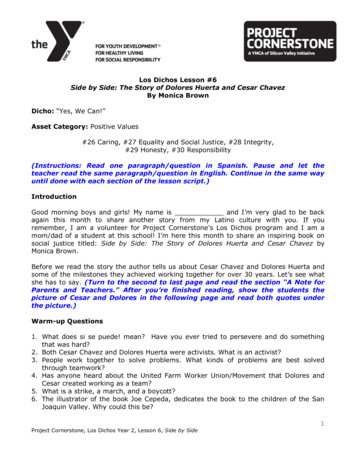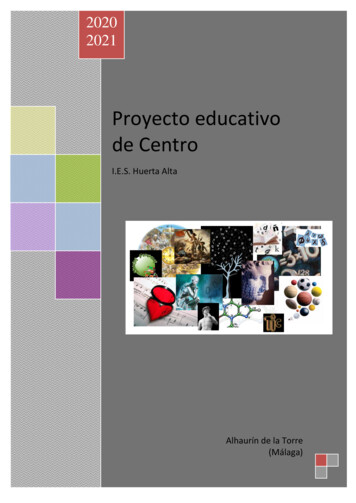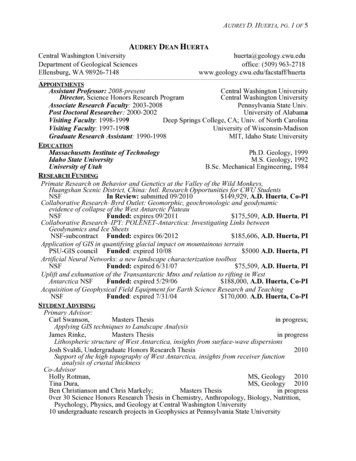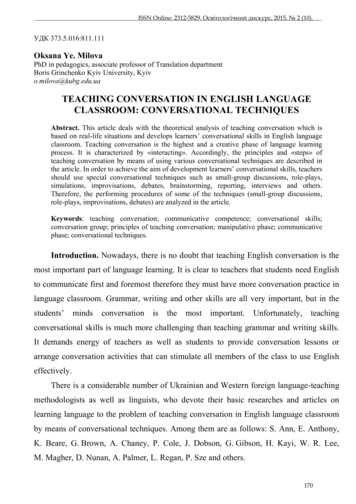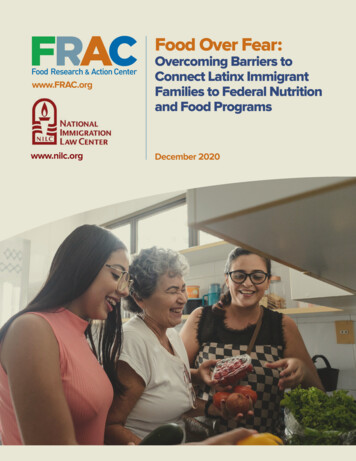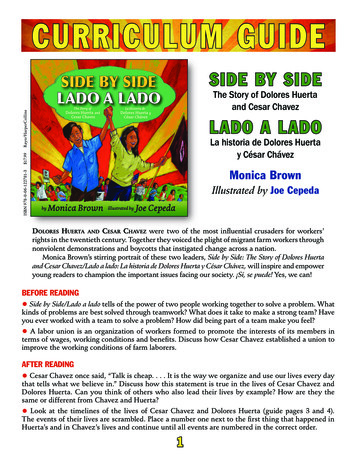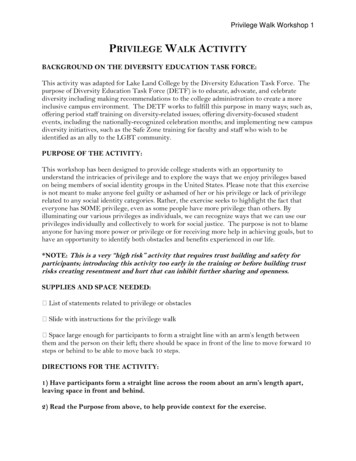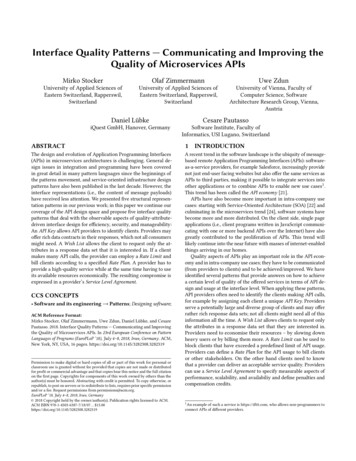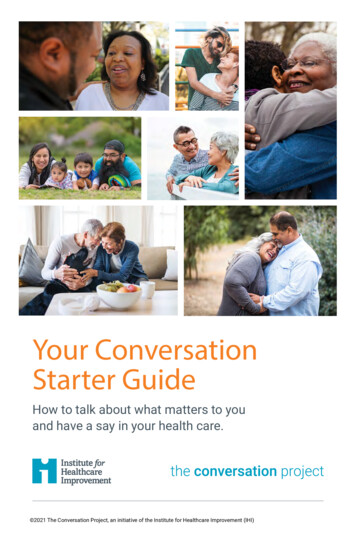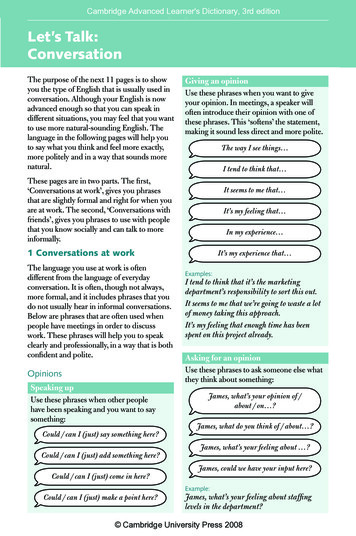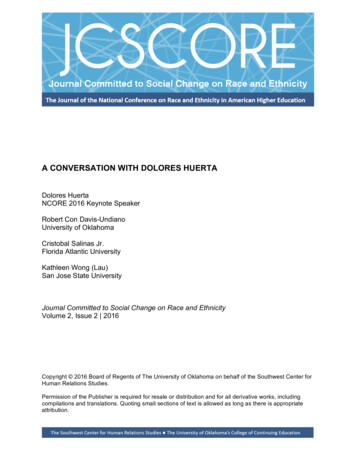
Transcription
A CONVERSATION WITH DOLORES HUERTADolores HuertaNCORE 2016 Keynote SpeakerRobert Con Davis-UndianoUniversity of OklahomaCristobal Salinas Jr.Florida Atlantic UniversityKathleen Wong (Lau)San Jose State UniversityJournal Committed to Social Change on Race and EthnicityVolume 2, Issue 2 2016Copyright 2016 Board of Regents of The University of Oklahoma on behalf of the Southwest Center forHuman Relations Studies.Permission of the Publisher is required for resale or distribution and for all derivative works, includingcompilations and translations. Quoting small sections of text is allowed as long as there is appropriateattribution.
Journal Committed to Social Change on Race and Ethnicity 2016A CONVERSATION WITH DOLORES HUERTADolores HuertaNCORE 2016 Keynote SpeakerRobert Con Davis-UndianoUniversity of OklahomaCristobal Salinas Jr.Florida Atlantic UniversityKathleen Wong (Lau)San Jose State UniversityDolores Huerta did an interview on June 1, 2016 in San Francisco at The HiltonSan Francisco Union Square. The interviewers were Robert Con Davis-Undiano,Cristobal Salinas, Jr., and Kathleen Wong (Lau)—all members of the executivecommittee of the Southwest Center for Human Relations Studies, the parentorganization for the National Conference on Race and Ethnicity in AmericanHigher Education (NCORE).Dolores Clara Fernández was born on April 10, 1930 in Dawson, New Mexico.She was born to Alicia Chavez and Juan Fernández; however, she spent a majority ofher time with her mother in Stockton, California, following her parents’ divorce. Whilethe separation made Dolores not able to see her father frequently, the two remainedclose and his political and labor activism later inspired her. When Dolores came ofworking age, she worked multiple jobs that left her displeased, and followed a passionfor teaching. While her teaching career only lasted a few months, Dolores decided shecould do more than just inspire the youth and decided to help parents win moreequitable working conditions by becoming part of the Community Service Organization(CSO).135
Journal Committed to Social Change on Race and Ethnicity 2016During her time at the CSO, Dolores Huerta met Cesar Chavez, who shared asimilar interest in having equitable working conditions for underprivileged communitiesof people. While the two were unable to achieve their ultimate goal for the CSO, the twothen cofounded the National Farm Workers Association. In this organization, Huertawas able to shape the national climate that led to the passage of the 1975 AgriculturalLabor Relations Act, which was the first law to recognize the rights of Californiafarmworkers to engage in collective bargaining. Also, during her time with the NationalFarm Workers Association, Huerta coined the phrase “Sí se puede!”, or yes, it ispossible. This phrase was used as a guiding principle to help inspire theaccomplishment of goals even in situations that, at times, seem insurmountable.Dolores has accomplished much after her time with Cesar. She was able tocofound the United Farm Workers’ (UFW) radio station, serve on the U.S. Commissionon Agricultural Workers for five years, was inducted into the National Women’s Hall ofFame in 1993, and was lastly awarded the Presidential Medal of Freedom in 2012, byPresident Obama. Dolores continues to work diligently developing leaders andadvocating for the working poor, women, and children. She is the founder and presidentof the Dolores Huerta Foundation, and she travels across the country engaging incampaigns and influencing legislation that supports equality and defends civil rights.Huerta has made a tremendous impact in this world, and will continue to do so until shefinds justice.On June 1, 2016, Dolores Huerta gave a welcomed keynote speech about theimportance of education and social justice at NCORE 2016 in San Francisco. After her136
Journal Committed to Social Change on Race and Ethnicity 2016keynote, in collaboration with Current Conversations with Robert Con Davis-Undiano,JCSCORE had the opportunity to interview Dolores Huerta.JCSCORE: Thinking about the Latino world and really America pre-Dolores Huerta andpre-Cesar Chavez, and post what you did with United Farm Workers in the 1960’s and70’s and really beyond that, it’s a different world now. Do you ever find yourselfreflecting back and think, my goodness, we walked on this stage of history and reallyhelped to change the world?Dolores: No, I think about it a lot because sometimes people will ask me, “Well, do yousee a difference?” Of course you see a difference.I remember when I went to college, there was a handful of us Latinos in college andsome of my friends actually changed their names; like, Estrella became Cruz. Theyanglicized their names. Martinez became Martin, because they were not reallyidentifying or being proud of who they were. And so, you fast-forward to today’s worldand now you have many of the institutions that are what they call Hispanic-servinginstitutions, or you have maybe half or even half of the population at the college, will beLatinos, and we see this throughout the country, not just in the Southwest but in NewYork City, or in New York state. I was just at a conference there, and then you see all ofthese organizations of Latino teachers, Latino engineers, Latino doctors. Latinas also,for example the Latina lawyer’s organization, so there’s been a tremendous amount ofprogress that has happened in the last few years.JCSCORE: If we can take you backward just a second, we think you met Cesar Chavezin a community service organization, in the 60’s. What were the aspirations that you andhe had at that point? What did you think you were doing at the time?137
Journal Committed to Social Change on Race and Ethnicity 2016Dolores: Well, our purpose was to organize people in their own communities so thatthey could go forward and help erase some of the discrimination that was going on, andnot only in their own communities: fighting a school issues, racism issues in thecommunity, but also to start dealing at the state and national level. I remember veryactive in passing laws to get ballots in the Spanish language in California, to get driver’slicenses in people’s ethnic language. We passed a very important law way back in 1961to remove the citizenship requirements so that people could get public assistance. Lateron, with United Farm Workers, we passed unemployment insurance for farm workers,the right to organize, so we worked at the local level to strengthen communities so thatthey could then influence their legislators and their Congress people. I mean we passeda law, and when you think about this to make it mandatory that employers throughoutthe United States have toilets in the fields for their workers, which they didn’t have.It was all done with the workers themselves organizing and putting pressure on theirlegislators to make these things happen.JCSCORE: Was there ever a moment where you, or you and Cesar realized, this couldbe transformative? We could be changing the culture of the United States, this couldhave huge implications; or were you just so busy changing the world around you, youdid not need to reflect? Which was it?Dolores: I think we were just trying to get people organized, getting them involved,making them understand that they had the power to make changes and that’s what ourpurpose was. I don’t think we were thinking of ourselves in any kind of a historicalcontext. I think other people that were working with us could see that, but we were justso busy organizing that, that wasn’t one of our thoughts.JCSCORE: What was Cesar Chavez like? What was it like to work with him? You werethe co-leaders of the United Farm Workers.138
Journal Committed to Social Change on Race and Ethnicity 2016Dolores: Well, Cesar was a very humble person; he didn’t really like a lot of attention,he was embarrassed by it. When people would shout, Viva Chavez, he would justcringe. He just wasn’t used to that and, because he felt that, a lot of the credit belongedto the workers that were doing the work; they were the ones that were making thingshappen. So he was very humble in that respect.He was a follower of Gandhi, the precepts of Gandhi, the whole idea of voluntarypoverty, the idea of non-violence and of course he committed his life to doing that withhis, in a very physical way by the, the long fasts that he took. He did three fasts. He didthe first one in 1960, let’s see ’68 for 25 days, and then in Arizona for 72 days,another water-only fast, and then the last one was for 36 days.It’s hard to say [if the fasts destroyed his health] because Cesar actually was not illwhen he passed away; he died in his sleep. And it was a very natural death and theinteresting thing about the cause you know his parents lived to be almost 100 years old;his dad was 101 and his mother was just a couple of years short of 100. But hisgrandfather, who Cesar was built like, died at exactly the same age as Cesar, 66 yearsold.JCSCORE: After all that you did, all that happened in those days, there are workingpoor people still there. As a country, we are not where we want to be, what do you haveto say about that?Dolores: I think the conditions for farm workers have improved. We know we have aswe talked before a lot of Latino professionals, and even farm workers you know hadtheir kids and the Ivy League colleges all over the country and that’s wonderful. Toknow that, but we know that because of the stagnation of wages, the assault on laborunions in the United States of America.139
Journal Committed to Social Change on Race and Ethnicity 2016You now have 26 states that now have right-to-work laws, which makes it very difficultfor unions to organize because they can’t collect the dues from workers, from theirpaychecks, which makes it easy for them to be able to fund the organizations.And so, it’s been very difficult and I think that there’s been an attack on labor unionsspecifically and that, of course, affects all workers and it also affects the formation of amiddle class in the United States.JCSCORE: You have been arrested, when you have been involved in peaceful protestsand marches. Getting arrested. What was that like?Dolores: Well, initially, we were arrested because we were trying to talk to workers,going to the fields and for trespassing and sometimes we would just go out there andthey would arrest us before we would get a chance to go into the field and talk toworkers. Some of my more recent arrests have been kind of in solidarity of othermovements. I was arrested with the LGBT community in San Francisco, when theywere trying to bring in more medicine so that the prescriptions that they needed, thatwere being blocked by the government. And then, I was arrested with casino workerswho were trying to organize in the casinos and were being denied the right to organize.And then, also arrested with the retail clerk’s union. Some of my arrests have been insupport of other organizations.JCSCORE: Getting arrested is one thing, but in September of 1988 in San Francisco,near the NCORE 2016 conference site, you were beaten by police when you were partof a peaceful protest against. And you almost died. They really went after you, they putyou in the hospital.Dolores: Right, right. That was the first [President] Bush, and it was interesting thatwhile we were out there protesting because he had said that there was nothing wrongwith pesticides, that the government takes care of us, and we don’t have to worry aboutthat. At the same time there were farm workers that were dying of cancer, children, farmworker children, a very, very high percentage of them dying of cancer. We actually had140
Journal Committed to Social Change on Race and Ethnicity 2016called for an additional third-grade boycott to bring attention to the pesticides on ourfood. And that’s what Cesar’s last fast was about. Also, it was about calling attention tothe poisons on our food.JCSCORE: How did it affect your perspective when you were beat and that you put inthe hospital? Did it change your view of things? Did it cause a period of reflection?Dolores: Well, we had met with a lot of violence in the farmworker movement. We hadfive people that were killed in the farmworker movement. One of the first one was ayoung Jewish girl from Boston named Nan Freeman; the second one was uh Juan de laCruz, a farm worker from Arvin, California, who was shot in the heart, on the picket line.The third one was Rufino Contreras, who was killed in the Calexico area there, a lettucefarm, where he was met with a hail of 80 bullets when he went into the field to talk tostriking farm workers; and then, Rene Lopez was our last martyr. Rene was organizedhis farm to vote for the union, and after they finished organizing and they won theelection, this is after we got the right to organize, the Agricultural Relations Act, he wascalled to an automobile and the owner’s brother-in-law, pulled out a gun and then shothim in the temple. They told him, he went down to the car, and they shot him in thetemple. And then we had another martyr, a young Arab named Nagi Daifallah, who waskilled by a sheriff in Kern County, near Bakersville.JCSCORE: You really have spent an entire life fighting for social justice, and very fewpeople can say that they have really supported one goal their entire life. Has that beendifficult? There must have been times where you have doubted yourself to always befocused towards one goal. What has that been like?Dolores: Well, I think all of the work that you do when you do social justice work, it’sbuilt on faith. I was a schoolteacher, I quit teaching school to come to Delano, with nomoney, and, in the middle of a divorce with seven children.141
Journal Committed to Social Change on Race and Ethnicity 2016And so, everybody thought I was crazy when I made that decision, but I never regrettedthat. Everything that we’ve done and I’ve done organizing is built on faith. You have tohave faith in yourself, you have to have faith in people, and even knowing when youhave obstacles or the things don’t go the way that you want them to go, that somehowthings will work out, as long as you don’t give up.JCSCORE: Almost any look at the national scene, right now, would tell us that thecountry desperately needs to talk about race in so many ways, and yet the discussionthat never seems to happen is the discussion of race. Why is race the mostuncomfortable topic in America?Dolores: I think this country was built on racism. When you think about what we did tothe Native Americans, to African slaves, to Asian people, or to Oriental Exclusion Act,the internment of the Japanese during World War II. We just have layers and layers andlayers of wrongdoing. It’s like the Howard Zinn history of the United States of America.And so, the Bracero program where Mexicans were brought in and they were almosttreated like slaves where they were worked with very little wages for the work that theydid, so I think we’ve just got so many layers of slavery. I think there’s a huge amount ofguilt.And I think we don’t really want to admit that we’ve done this, and people want to try toignore it. Racism justifies some people keeping their power, because they can always. Ilike to say, they kept the farm workers without toilets or drinking water, you know withpeople that feed us, that put the food on our table, and they’re not respected. They’renot acknowledged, and somehow this justifies putting people being able to make profitsoff of workers and not acknowledging the workers that really built the wealth of thecountry. I think there’s a lot of guilt involved in that and I think somehow we have tofigure out a way to do some kind of reconciliation, just like they did in South Africa. Thisis so that we can say to people, well you don’t have to feel guilty.142
Journal Committed to Social Change on Race and Ethnicity 2016We’ve all have to identify this issue; we’ve have to acknowledge that racism exists andthat people are getting killed because they’re black or brown, and people are beingmistreated, people are being incarcerated. The whole immigration issue, it’s not aboutpeople crossing the border, it’s about building prisons and saying that you havecommitted a crime when crossing the border’s not a crime. It’s a civil offense. So,there’s profits that are being made out of racism and we’ve got to identify this andacknowledge it and then say to everybody and to all of our institutions and our, ourgovernment agencies. Everybody here has got to take a position and to startacknowledging and start working to end the racism.Racism is so much in the fabric of American culture.People have to be nudged into it, and called out. If you’re not doing something to endracism, then, as the Black Panthers used to say, “You’re either part of the solution oryou’re part of the problem.”And, I think that we have, not only a commitment, but also accountability. I thinkanybody, any organization that gets any kind of federal funds or state funds in theUnited States of America, has to say, “As part of this money that you’re getting from thetaxpayers of the country, we’ve got to do something to erase the racism in youragency.” You know, in your institution, in your organization, and in your community,otherwise I think it’s going to continue. And now’s the time because now we see that it’sso public. You know, it’s very public when you have people who are quote-unquoteleaders can come out.You know, with impunity, and just attack people of color the way that they’re doing.JCSCORE: If you could tell people the one thing that could maybe move things in theright direction that they can do, what occurs to you? What one thing would you say is animportant step that people could take?143
Journal Committed to Social Change on Race and Ethnicity 2016Dolores: Well, the one thing that’s very simple and one great power that we all have isto vote.We can vote people into school boards, and that [voting action] will say, “Okay, I’mgoing to commit to do something about erasing the racism in our school district.”Because we know that racism is based on ignorance. And so, if people will commit tostart teaching ethnic studies, say in kindergarten through high school, people will startlearning how, and where does this racism come from. How does it manifest itself. And,how people suffer from racism. So, then I think that’s one thing, people have to againidentify it and acknowledge it. This is why I always suggest that people show the movieof Emmett Till, this young 14-year-old African-American youngster who went fromChicago to Mississippi and was killed because he whistled at a white woman.Showing maybe movies like Viva La Causa, which is the Southern Poverty LawCenter’s movie about the farm worker, about the great boycott and, again, becauseotherwise they don’t know. Because we live in so many siloes, we don’t walk in eachother’s shoes, and people are taught to be afraid of each other, and, it’s also kind of Ithink tied into the violence that we have in our society, because we have a very, veryviolent culture. We’ve got to start, and we could make it end, we really can. It’s notgoing to happen unless we all work very hard. And I like to quote Reverend Jim Lawsonwhen he says, “We’ve got to dismantle, these institutional systems of oppression andracism.”JCSCORE: In your lifetime, do you think you will see additional major change in socialjustice issues toward the good in the United States? Do you expect to see that in yourlifetime?Dolores: I see it happening right now. I think it’s very visible. I mean, we have theOccupy movement. For instance, that brought to the attention of the disparities; wehave the Black Lives Matter movement that is happening right now, in terms of callingattention to the slayings of African-Americans by police. This whole culture of police144
Journal Committed to Social Change on Race and Ethnicity 2016violence that is happening everywhere. Even in my own city, Bakersville, California, hasjust been acknowledged as one of the cities that has the highest number of people thathave been killed by police in the United States per capita, my own city.The large expulsion of African-American and Latino students that are going all over thecountry into to the school-to-prison pipeline, that we have to also dismantle. I see ithappening now and I think the young people are going to be in the vanguard of this.We’ve seen people like the Dreamers for instance that were able to get the mostpowerful person in the world, President Obama, to do an executive action that theycould stay in the country and go to school and get work permits and driver’s licenses.It’s going to be led by a lot of the young people and I think by the educators, becausethe educators are the one group that can really understand what’s going on. I thinkother people are too busy with their lives and they see it on the news and they don’tthey feel like helpless or hopeless that they can’t do anything about it, but I think oureducators can be in the forefront of changing our whole system of racism that we have.JCSCORE: Organizations like the National Conference on Race and Ethnicity, whichyou are a part of right now in San Francisco; what role can organizations like this, whereeducators come from all over the United States and talk for several days and try tomake plans, can that be part of, is that an important part of what you are describing?Dolores: Absolutely, but I think that they’ve got to make a commitment, to not just beteachers but to be organizers. They are the leaders in our community, but I don’t thinkthat they acknowledge themselves as leaders. I think other people see educators asleaders, but they don’t see themselves as leaders, and they’ve got to take on thatmantle, which of course means extra work for them because we know that educatorshave so much work to do to begin with in terms of trying to teach and be in theeducational system, with its own problems that it has. We’re asking them to take anextra step to go out to the community, and get out of their comfort zone of the schoolsystem and go out to the community and start teaching people in the community whatthey need to learn about race and racism.145
Journal Committed to Social Change on Race and Ethnicity 2016JCSCORE: What message would you like Americans, for those who are reading thisinterview, to know and reflect about the struggles that we face for social justice inAmerica?Dolores: That we need to be reoriented, our whole society in the United States, to thinkof one of sharing, and one of caring for each other. When we think of social justice, wethink of not only equality, and I know people who say, “Well, not everybody can beequal, right?” But the thing is that we don’t have to oppress certain groups in oursociety, the disabled or the mentally ill; people should be cared for, and we have aresponsibility as citizens to do that.I think that we also need to be more demanding because these are our tax dollars thatwe are paying and we need to ask, “where are our tax dollars going?”We have asked those questions, and we can’t feel ever that that’s not our right.I’m a citizen participation, we’re doing this with the Dolores Huerta Foundation, with myorganization. We’re organizing parents, so that they can come to the school districtsand they can say, “Okay, we want to look at that budget and see how you’re spendingthat money.”And we have been very successful, we have found in one little school district over there,we had somebody who was earning a six-figure salary that didn’t have a certification.When parents started asking questions of that administrator, and he couldn’t answer thequestion, then they started looking a little bit deeper. They found out that this personwas not even certified but he had received that position because he had friends on theschool board.Things of that nature it was because when people participate they should never feelthat, they don’t have a right to do that. That’s where the power comes from.146
Journal Committed to Social Change on Race and Ethnicity 2016Being involved and taking responsibility for what I am doing as a social justice leader isfor the people.JCSCORE: Can you make a prediction of something that will impact the Latinocommunity, good or bad, but you think is, is really looming on the horizon out there inthe next 10 or 20 years that people could look for.Dolores: I see the Latino community playing a much more powerful role in the UnitedStates of America, in our own country. Also, when you talk to many of the students andI always ask them, “what are you majoring in?” And so many of them are majoring ininternational studies. I see that a lot of our young people coming out of the colleges aregoing to be more involved in international politics, and because they understand theramifications and the implications of a global world.And that’s what I see in the future, that so many of our young people are much morevisionary than the rest of us are, and so I think the Latino community is going to have avery powerful role in the history in the future of the United States of America, and we’vealways had a role.A bigger role and I think more links with Latin America and I think we’re going to belearning from Latin America; we’re going to be learning from Cuba, now that we have arelationship with Cuba. People say wow, how are the Cubans able to do all theseincredible things like having free healthcare for every citizen, free education for everycitizen, and yet be able to maintain their country, when they’re a very, have a very pooreconomy that’s had an economic boycott in the country but our young people are veryopen, curious, and they all want a better world, because so many of their families havesuffered so that they could have an education and create a better world.147
pre-Cesar Chavez, and post what you did with United Farm Workers in the 1960's and 70's and really beyond that, it's a different world now. Do you ever find yourself . We passed a very important law way back in 1961 to remove the citizenship requirements so that people could get public assistance. Later on, with United Farm Workers, we .
